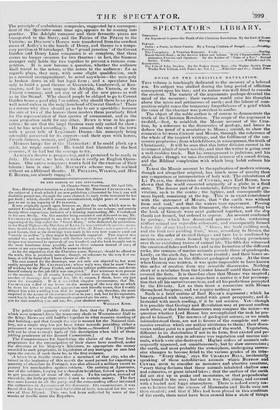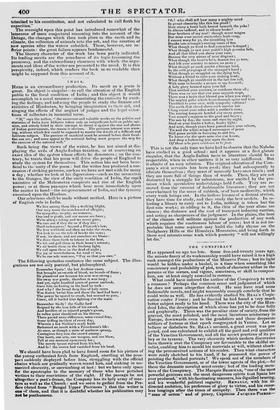ROSSE ON THE CHRISTIAN REVELATION.
THIS volume is touchingly dedicated to the memory of a beloved sari. Its subject was studied during the long period of affliction consequent upon his loss; and its nature was well fitted to console the student. The variety of the arguments perhaps diverted the mind of the mourner; their vastness would raise his thoughts above the mists and pettinesses of earth; and the labour of com- position might cause the temporary forgetfulness of a grief which the voice of the charmer was powerless to soothe. The object of the noble author is of course to demonstrate the truth of the Christian Revelation. The scope of the argument is twofold,—first, to establish the Mosaic account of the Crea- tion, by a reference to the discoveries of geology, and hence to deduce the proof of a revelation to Moses ; second, to show the connexion between CHRIST and MOSES, through the coherence of the whole of the inspired writings, and the fulfilment of the suc- cessive prophecies ; from which follows, in consequence, the truth Of Christianity. It will be seen that this latter division cannot in its treatment admit of much novelty, and that the writer is going over a well-trodden track. But his arrangement is judicious, and his style clear ; though we miss the critical acumen of a sound divine, and the Biblical complexion with which long habit colours his
To test the Mosaic account lay the application of modern science, though not altogether original, has much more of novelty than any comparison or interpretation of holy writ. The calculations of
LA PLACE, the discoveries of CUVIER, says Earl Rossx, have shown that the world consisted originally of a globe in a fluid
state. The denser part of its materials, following the law of gra- vitation, sank to the centre ; the lighter, and consequently the more liquid, remaining at the top. This is in exact consistency
with the statement of MOSES, that " the earth was without
form and void," and that the waters were uppermost. Passing over the arguments upon the firmament, the waters, according to
the book of Genesis were next gathered together, and the dry (land) not formed, but ordered to appear. An account confirmed by geology, which has discovered primary rocks, containing
neither animal nor vegetable substance, and consequently formed
before life of any kiwi existed. " Crass, the herb yielding seed, and the fruit tree -yielding fruit," were, according- to MOSES, the
next in the order of created things : and here he is confirmed by
modern science; strata formed by vegetables taking precedence over those exhibiting traces of animal life. The fifth day witnessed
the creation of fishes and fowls : and in the formation of the different rocks, the remains of marine animals precede those ofquadrupeds. Lastly, on the sixth day, beasts were created : and their bones oc-
cupy the last place in the different geological strata. At the time when Genesis was written, it was quite impossible to have known this order of creation from ally scientific discoveries. Nothing short of a revelation from the Creator himself could then have dis- covered the facts. It is therefore clear that Moms was inspired; and his inspiration upon so important a matter is a fair presump- tion that all his narratives are true, and all his predictions prompted by the Divinity. Let us then trace a connexion with MOSES throughout Scripture, and we require nothing more. Such is a brief outline of Earl Rossa's argument ; which he has expanded with variety, stated with great perspicuity, and il- lustrated with much reading, if it be not science. Yet—though it is possible that Geology and Revelation may at present confirm each other, or that future discoveries may compass the union—we question whether Lord RossE has accomplished the task he pro- posed to himself. The masters of geological science, or we much misunderstand them, are not its favour of the complete and suc- cessive creation which our author attributes to them; their disco- veries rather point to a gradual growth of the world. Vegetation, different in its distribution if not in its form, first existed and pe- rished. Another step in advance was vegetation and marine ani- mals, which were also destroyed. Higher orders of' animals sub- sequently appeared, not simultaneously, but by slow successions ; the earth, and most probably the atmosphere, undergoing succes- sive changes to become fitted to the various grades of its inha- bitants. "Every thing," says Sir CHARLES BELL, incidentally speaking of those antediluvian animals which BUFFON and CUVIER seem to consider as monsters and abortive creations, "every thing declares that these animals inhabited shallow seas and estuaries, or great inland lakes ; that the surface of the earth did not rise up in peaks and mountains, or that perpendicular rocks bound in the seas; but that it was fiat, slimy, and covered with a loaded and foggy atmosphere. There is indeed every rea- son to believe that the classes of Mammalia and Birds were not then created ; and that if Man had been placed in this condition of the earth, there must have been around him a state of things,
Unsuited to his constitution, and not calculated to call forth his capacities."
The oversight upon this point has introduced somewhat of the lameness of mere conjectural reasoning into the account of the Deluge, the changes which then took place in the earth and its climate, the collection of animals into the ark, and the creation of new species after the waters subsided. These, however, are in- ihrior points : the great failure appears fundamental.
The literary character of the work has been partly indicated. Its leading merits arc the soundness of its logic (assuming the premises), and the extraordinary clearness with which the argu- ments and ideas of the writer are presented to the mind. It is this Perspicuity, indeed, which renders the book mere readable than might be supposed from this account of it.























 Previous page
Previous page